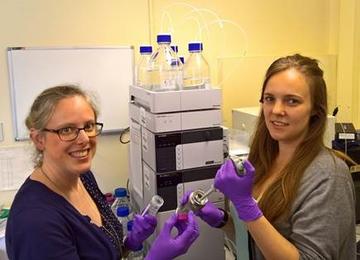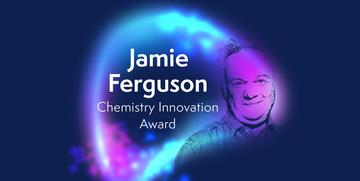Student Innovation at Oxford Chemistry
Student Innovation at Oxford Chemistry
The Department of Chemistry, in partnership with Oxford University Innovation (OUI), is launching the inaugural Jamie Ferguson Chemistry Innovation Award for Oxford Chemistry students. This award has been created as a legacy to our dear friend and colleague Dr Jamie Ferguson who tragically died in August 2020 after succumbing to COVID-19.
The Department of Chemistry has an outstanding track record in translating fundamental research to effect real-world change. Since 2006, when Jamie Ferguson joined OUI and worked with us to translate our research, the Department has incorporated 26 spinout companies, negotiated 150 commercial deals with industry, and applied for over 600 patents.
Our students are an essential part of our research community and an important contributor to the innovative research taking place within the Department. With around 165 Part II students and 450 postgraduate students all conducting their own research, many in collaboration with industrial partners, there are many ways for our students to turn their innovative ideas into real-world impact.
Here we showcase the achievements of some of our entrepreneurial students.
Spinning out success
Enzbond
Launched in 2016, Enzbond, a biotech company which commercialises in-silico technology, was the first student-led company to spinout from the Department of Chemistry. Co-founded by Rob Simion (DPhil Chemistry 2011) and Alina Rakhimova (DPhil Biochemistry), the pair developed the underlying technology and pitched to pharmaceutical partners and investors, achieving all this whilst still postgraduate students.
The idea came to Rob, now Chief Technology Officer of Enzbond, while designing small molecule catalysts in Professor Rob Paton's research group, wondering which ones would be effective for synthesis, and whether computational methods would help. With support from professors Rob Paton and Steve Davies (Chemistry) and Professor Catherine Pears (Biochemistry), he and Alina were able to set up a month-long project to demonstrate their technology. Once they had proof of concept, they successfully pitched to pharmaceutical companies including AstraZeneca and GSK, attending these meetings between their thesis submission and viva.
Enzbond continue to grow; they have clients spanning synthetic biology, agriculture and big pharma, and are looking to develop their technology to facilitate cleaner and more efficient drug production. Rob’s advice to aspiring scientific entrepreneurs is to persevere with your idea. He says: "Everybody needs to create their own direction. You'll get a thousand and one different suggestions, but the one that's right is the one you believe in."
HydRegen
HydRegen was spun-out of the Department of Chemistry by Professor Kylie Vincent and Dr Holly Reeve in 2021. The company develops hydrogen-powered biotechnology to produce safe, clean pharmaceuticals and speciality chemicals using existing chemical infrastructure.

Professor Kylie Vincent and Dr Holly Reeve
The science underpinning HydRegen's innovative technology stems from Holly’s undergraduate (Part II) research on enzyme catalysis. Challenged by Kylie to achieve hydrogen driven co-factor recycling using enzymes mounted on carbon beads along with hydrogen gas, Holly succeeded in converting the cofactor NAD+ into its more expensive version, NADH. She continued her research, gaining a DPhil under Kylie’s mentorship, and further developed the hydrogen-powered NADH recycling process to drive a range of enzyme-catalysed reactions which all depend on NADH as the hydride donor. Together, Kylie and Holly went on to win the Royal Society of Chemistry’s Emerging Technologies Competition in 2013.
To enable her to transition from research scientist to Chief Executive Officer of HydRegen, Holly took advantage of courses available to research students on intellectual property, enterprise, and seed funding by MPLS and OUI, and, with support from her college, completed an entrepreneurial course at the Saïd Business School. Holly says, “I had to develop a new style of communication, a different way of looking at my research, and a new set of skills for investigating how to push our technology forward.”
Read Holly’s blogpost on being a science entrepreneur here.
Bridging academia and industry
Industrial collaborations and commercialisation are fundamental to achieving long-term global impacts, and our Centres for Doctoral Training help provide that bridge between academia and industry.
The Centre for Doctoral Training in Synthesis for Biology & Medicine (SBM CDT) focuses on training in chemical synthesis and its application to biology & medicine. The CDT is backed by EPSRC and 13 pharmaceutical and agrochemical companies (AstraZeneca, DSTL, Diamond Light Source, Evotec, GlaxoSmithKline, Janssen, MSD, Novartis, Pfizer, Syngenta, Takeda, UCB and Vertex), and operates a unique open-access IP model. This network has been vital for the success of the programme and in attracting outstanding students (133 students have been admitted to the programme since 2014).

Dr Yao Shi
These close industrial links sparked Dr Yao Shi, a student from the 2014 cohort working with Professor Darren Dixon, to start spinout company Cortex Organics in 2018, with support from OUI.
“After speaking with industrial partners, I was intrigued to find synthesis still represents one of the biggest challenges for progressing drug discovery programmes. In many cases, very valuable but difficult target molecules have previously failed to succumb to synthesis even after extensive synthetic efforts”, explains Yao, CEO and co-founder. Throughout the last three years, Cortex Organics have developed commercially viable total syntheses of several valuable natural product targets, as well as helping biopharma clients successfully complete many other complex target molecules.
Winning Innovations
Over recent years students from the Department of Chemistry have excelled in innovation competitions at Oxford. In July 2019, OUI in partnership with the Foundry and OxSciences launched the inaugural Student Entrepreneurs Program (StEP). Jamie Ferguson was a key member of the founding team and a champion of the program at the Department. The winners of StEP 2019 were Quantum Dice - a team of six students including two from Chemistry: Wenmiao Yu and Omar Tsang. Quantum Dice are still going strong and in 2021 raised £2M seed funding.
In 2021, OUI launched the ClimateTech and Sustainability Innovation Challenge. Amongst a strong line-up of finalists in the challenge was Jake Yang from Professor Richard Compton’s research group, with a ‘High-throughput electrochemical sensor for continuous global monitoring of phytoplankton to better understand ocean health’.
Jamie Ferguson Chemistry Innovation Award

The Jamie Ferguson Chemistry Innovation Award is a great starting point for students to translate their research into real-world applications to create positive impact in the world around them. Oxford Chemistry students can learn more about the Jamie Awards on the intranet page here.
We look forward to profiling the winners later in the year.




